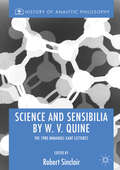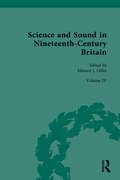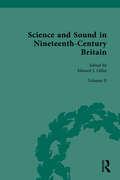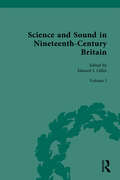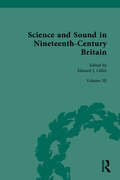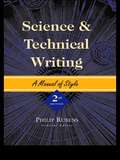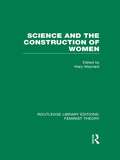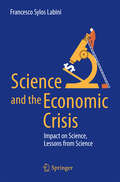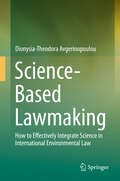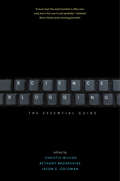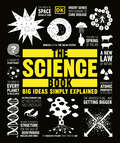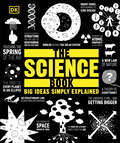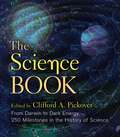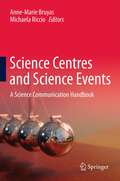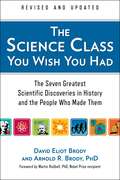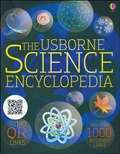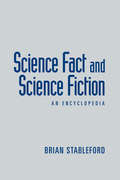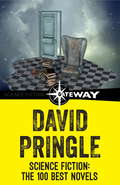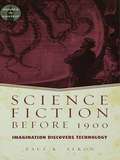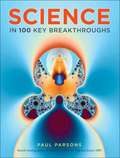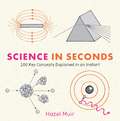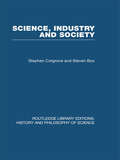- Table View
- List View
Science and Sensibilia by W. V. Quine: The 1980 Immanuel Kant Lectures (History of Analytic Philosophy)
by Robert SinclairIn this book, W. V. Quine’s Immanuel Kant Lectures entitled Science and Sensibilia are published for the first time in English. These lectures represent an important stage in the development of Quine’s later thought, where he is more explicit about the importance of physicalist constraints in his account of the steps from sensory stimulation to scientific theory, and in further using them to assess the extent to which mental vocabulary is defensible. Taken as a unit, these lectures fill an important gap in our understanding of his philosophical development from his 1973 work The Roots of Reference to his later work. The volume further contains an introduction that outlines the content and philosophical significance of the lectures. In addition, several essays written by leading scholars of Quine’s philosophy provide further insight into the important issues raised in the lectures.
Science and Sound in Nineteenth-Century Britain: Sound Transformer (Nineteenth-Century Science, Technology and Medicine: Sources and Documents #4)
by Edward J. GillinSound and Science in Nineteenth-Century Britain is a four-volume set of primary sources which seeks to define our historical understanding of the relationship between British scientific knowledge and sound between 1815 and 1900. In the context of rapid urbanization and industrialization, as well as a growing overseas empire, Britain was home to a rich scientific culture in which the ear was as valuable an organ as the eye for examining nature. Experiments on how sound behaved informed new understandings of how a diverse array of natural phenomena operated, notably those of heat, light, and electro-magnetism. In nineteenth-century Britain, sound was not just a phenomenon to be studied, but central to the practice of science itself and broader understandings over nature and the universe. This collection, accompanied by extensive editorial commentary, will be of great interest to students and scholars of the History of Science.
Science and Sound in Nineteenth-Century Britain: Philosophies and Epistemologies of Sound (Nineteenth-Century Science, Technology and Medicine: Sources and Documents #2)
by Edward J. GillinScience and Sound in Nineteenth-Century Britain is a four-volume set of primary sources which seeks to define our historical understanding of the relationship between British scientific knowledge and sound between 1815 and 1900. In the context of rapid urbanization and industrialization, as well as a growing overseas empire, Britain was home to a rich scientific culture in which the ear was as valuable an organ as the eye for examining nature. Experiments on how sound behaved informed new understandings of how a diverse array of natural phenomena operated, notably those of heat, light, and electro-magnetism. In nineteenth-century Britain, sound was not just a phenomenon to be studied, but central to the practice of science itself and broader understandings over nature and the universe. This collection, accompanied by extensive editorial commentary, will be of great interest to students and scholars of the History of Science.
Science and Sound in Nineteenth-Century Britain: Sounds Experimental and Entertaining (Nineteenth-Century Science, Technology and Medicine: Sources and Documents #1)
by Edward J. GillinSound and Science in Nineteenth-Century Britain is a four-volume set of primary sources which seeks to define our historical understanding of the relationship between British scientific knowledge and sound between 1815 and 1900. In the context of rapid urbanization and industrialization, as well as a growing overseas empire, Britain was home to a rich scientific culture in which the ear was as valuable an organ as the eye for examining nature. Experiments on how sound behaved informed new understandings of how a diverse array of natural phenomena operated, notably those of heat, light, and electro-magnetism. In nineteenth-century Britain, sound was not just a phenomenon to be studied, but central to the practice of science itself and broader understandings over nature and the universe. This collection, accompanied by extensive editorial commentary, will be of great interest to students and scholars of the History of Science.
Science and Sound in Nineteenth-Century Britain: Sound in Context (Nineteenth-Century Science, Technology and Medicine: Sources and Documents #3)
by Edward J. GillinScience and Sound in Nineteenth-Century Britain is a four-volume set of primary sources which seeks to define our historical understanding of the relationship between British scientific knowledge and sound between 1815 and 1900. In the context of rapid urbanization and industrialization, as well as a growing overseas empire, Britain was home to a rich scientific culture in which the ear was as valuable an organ as the eye for examining nature. Experiments on how sound behaved informed new understandings of how a diverse array of natural phenomena operated, notably those of heat, light, and electro-magnetism. In nineteenth-century Britain, sound was not just a phenomenon to be studied, but central to the practice of science itself and broader understandings over nature and the universe. This collection, accompanied by extensive editorial commentary, will be of great interest to students and scholars of the History of Science.
Science and Technical Writing: A Manual of Style
by Philip RubensWith this new edition, Science and Technical Writing confirms its position as the definitive style resource for thousands of established and aspiring technical writers. Editor Philip Rubens has fully revised and updated his popular 1992 edition, with full, authoritative coverage of the techniques and technologies that have revolutionized electronic communications over the past eight years.
Science and Technology Digest Part-1 class 10 - NCERT
by NavneetScience and Technology Digest (Part 1): Standard X is a complete and unique book for the benefit of students. This Digest will help in fetching brilliant results in the examination and will lay a strong foundation for the future college education, thereby opening the way for opportunities of higher education.
Science and Technology Digest Part-2 class 10 - NCERT
by NavneetScience and Technology Digest (Part 2): Standard X is a complete and unique book for the benefit of students. This Digest will help in fetching brilliant results in the examination and will lay a strong foundation for the future college education, thereby opening the way for opportunities of higher education.
Science and the Construction of Women: Feminist Theory: Science And The Construction Of Women (rle Feminist Theory) (Routledge Library Editions: Feminist Theory)
by Mary MaynardScience and the Construction of Women is a multi-disciplinary exploration of the major questions currently challenging feminist scholars of science. The authors ask key questions: What constitutes science? How have feminists investigated it? How does science ‘construct’ women? How can we create a feminist discourse of science? Are the current developments to women’s advantage or disadvantage? Their answers draw on material from a wide range of natural scientific, humanities and social science sources, critically examining theoretical approaches from the postmodern to the materialist to the cyborgian. A key argument of the book is that there are strong intellectual and pragmatic reasons – the rapid development of information technology, advances in fertility treatment and genetic engineering, feminist concern for environmental issues – why feminism must rigorously engage with issues of a scientific and technological nature. Science and the Construction of Women provides an important contribution to the opening-up and broadening of debate in the field. This book will be an important text for students of gender and women’s studies, and science studies. It is also designed to be read by feminists both inside and outside the academy and to appeal to all those with interests in the sociology of knowledge and the history of ideas.
Science and the Economic Crisis
by Francesco Sylos LabiniThis book not only explores the ways in which theeconomic crisis and associated austerity policies have adversely impacted thephysical and human infrastructure and conduct of scientific research, but alsoconsiders how science can help us to understand the crisis and provide originalsolutions. Starting with a detailed but accessible analysis of the scientificmethod and the nature of scientific prediction, the book proceeds to addressthe failure to forecast the economic crisis and the origins of the continuinginertia in economic policy and theory. Attention is drawn in particular to theshortcomings of neoclassical economics in terms of its description of theeconomic system as being mechanical in nature and characterized by equilibrium. This perspective mirrors the limitations and outdated ideas of nineteenthcentury physics, which the book contrasts with the insights offered by modernphysics. The impact of neoliberal ideologies on scientific research is alsodiscussed in detail, highlighting their stifling effect on innovation anddiversification. In closing, the book emphasizes the need for stateintervention to guide and support scientific research as the core engine ofeconomic development that will deliver a sustainable future.
Science-Based Lawmaking: How to Effectively Integrate Science in International Environmental Law
by Dionysia-Theodora AvgerinopoulouThe Book takes the approach of a critique of the prevailing international environmental law-making processes and their systemic shortcomings. It aims to partly redesign the current international environmental law-making system in order to promote further legislation and more effectively protect the natural environment and public health. Through case studies and doctrinal analyses, an array of initial questions guides the reader through a variety of factors influencing the development of International Environmental Law. After a historical analysis, commencing from the Platonic philosophy up to present, the Book holds that some of the most decisive factors that could create an optimized law-making framework include, among others: progressive voting processes, science-based secondary international environmental legislation, new procedural rules, that enhance the participation in the law-making process by both experts and the public and also review the implementation, compliance and validity of the science-base of the laws. The international community should develop new law-making procedures that include expert opinion. Current scientific uncertainties can be resolved either by policy choices or by referring to the so-called „sound science.“ In formulating a new framework for environmental lawmaking processes, it is essential to re-shape the rules of procedure, so that experts have greater participation in those, in order to improve the quality of International Environmental Law faster than the traditional processes that mainly embrace political priorities generated by the States. Science serves as one of the main tools that will create the next generation of International Environmental Law and help the world transition to a smart, inclusive, sustainable future.
Science Blogging
by Bethany Brookshire Christie Wilcox Jason G. GoldmanHere is the essential how-to guide for communicating scientific research and discoveries online, ideal for journalists, researchers, and public information officers looking to reach a wide lay audience. Drawing on the cumulative experience of twenty-seven of the greatest minds in scientific communication, this invaluable handbook targets the specific questions and concerns of the scientific community, offering help in a wide range of digital areas, including blogging, creating podcasts, tweeting, and more. With step-by-step guidance and one-stop expertise, this is the book every scientist, science writer, and practitioner needs to approach the Wild West of the Web with knowledge and confidence.
The Science Book: Big Ideas Simply Explained (DK Big Ideas)
by DKNow in Paperback! Take science to a whole new level. Created in partnership with Prentice Hall, the Big Idea Science Book is a comprehensive guide to key topics in science falling into four major strands (Living Things, Earth Science, Chemistry, and Physics), with a unique difference — a website component with 200 specially created digital assets that provide the opportunity for hands-on, interactive learning.
The Science Book (DK Big Ideas)
by DKLearn about our world, the universe, and groundbreaking discoveries in The Science Book.Part of the fascinating Big Ideas series, this book tackles tricky topics and themes in a simple and easy to follow format. Learn about Science in this overview guide to the subject, great for beginners looking to learn and experts wishing to refresh their knowledge alike! The Science Book brings a fresh and vibrant take on the topic through eye-catching graphics and diagrams to immerse yourself in. This captivating book will broaden your understanding of Science, with:- More than 100 ground-breaking ideas in this field of science- Packed with facts, charts, timelines and graphs to help explain core concepts- A visual approach to big subjects with striking illustrations and graphics throughout- Easy to follow text makes topics accessible for people at any level of understandingThe Science Book is the perfect introduction to every area of this topic – astronomy,biology, chemistry, geology, maths, and physics, aimed at adults with an interest in the subject and students wanting to gain more of an overview. Here you’ll discover 80 trail-blazing scientific ideas, which underpin our modern world, giving us everything from antibiotics to gene therapy, electricity to space rockets, and batteries to smart phones.Your Science Questions, Simply ExplainedWhat is string theory or black holes? And who discovered gravity and radiation? If you thought it was difficult to learn structure and behavior of the physical and natural world, The Science Book presents key information in a clear layout. Learn about the history of science, covering topics like why Copernicus’s ideas were controversial, how Einstein developed his theories of general and special relativity, and how Crick and Watson suggested a structure for DNA - with fantastic mind maps and step-by-step summaries.The Big Ideas SeriesWith millions of copies sold worldwide, The Science Book is part of the award-winning Big Ideas series from DK. The series uses striking graphics along with engaging writing, making big topics easy to understand.
The Science Book: From Darwin to Dark Energy, 250 Milestones in the History of Science (Union Square & Co. Milestones)
by Clifford A. PickoverFrom astronomy to psychology, this beautifully illustrated chronology presents the most important and groundbreaking milestones in science. Award-winning author Cliff Pickover (The Math Book, The Physics Book, and The Medical Book) gathers into one fully illustrated volume the most important thinkers and ideas in the history of science. This unique omnibus edition includes 250 thoughtfully selected entries from many of the science-based books in the Sterling Milestones series, including math, physics, medicine, biology, chemistry, engineering, psychology, and space. With a new introduction by Pickover explaining how this impressive collection was curated,The Science Book showcases humanity&’s greatest achievements and provides readers with a sense of wonder at the diversity of scientific discovery.
Science Centres and Science Events
by Anne-Marie Bruyas Michaela RiccioThe idea for this text stemmed from the fruitful experience gathered during the training course of 9 Nigerian university students organized in Naples from 3 to 18 September 2008 by the team of Fondazione IDIS-Città della Scienza under the project Science Centre Owerri. The training course turned out to be not only an educational opportunity to acquire knowledge and skills for these students, but also a real and practical tool that later led to the realization of the first Science Festival of Owerri in Nigeria in May 2009. This in turn sparked the idea of creating a highly practical handbook for those who want to face the challenge of developing new projects for the dissemination and socialization of science in developing countries. In these countries, the role of scientific education and training in schools is not sufficient to arouse scientific curiosity among young people and make the population aware of the importance of scientific knowledge in everyday life. Moreover science and technology are indispensable tools for people's empowerment and should be supported with actions that encourage curiosity about science and the intelligent use of technology to bridge the divide with developed countries. It is therefore necessary to set up activities that are carefully targeted to promote and communicate science. The text has been designed as a practical guide to be used in a variety of contexts: scientific events or more structured science festivals, training, the creation of scientific cultural associations, and the development of new science centres. Besides being an excellent tool for training and supporting the design and planning phases, the manual can also be used as a reference work for institutions and local cultural services which have to select projects of this type.
The Science Class You Wish You Had (Revised Edition)
by A. Brody D. BrodyWhat does E=mc2 really mean? What is DNA? What was the big bang? These scientific concepts have changed our perception of the world...but for many of us they remain mysteries, bits and pieces of information retained from classroom lectures but never truly understood. Now we can finally grasp the grandeur and complexity of these ideas, and their significance in our lives. Revised and updated to include the latest discoveries that are changing the way we view the world and the universe, this new edition of The Science Class You Wish You Had will take you on a journey through space and time--from the subatomic to the universal. It explains in a lively, accessible way what these milestones of scientific discovery mean and what direct impact they have on our lives today and will have in the future. For everyone interested in science, history, and biographies of extraordinary people--or anyone who wants to understand the workings of the physical world--this thorough and authoritative book is a perfect introduction to science's most profound discoveries, and a testament to the triumph of human knowledge. Newton: Gravity and the Basic Laws of Physics Rutherford and Bohr: The Structure of the Atom Einstein: The Principle of Relativity Hubble: The Big Bang and the Formation of the Universe Darwin: Evolution and the Principle of Natural Selection Flemming and Mendel: The Cell and Genetics Watson and Crick: The Structure of the DNA Molecule
Science Encyclopedia (Science Encyclopedia Series)
by Kirsteen Rogers Laura Howell Alastair SmithThis is a comprehensive science reference book covering key topics from gravity, flight and floating to genes and DNA, with clearly written explanations and superb photographs and illustrations. <P><P>With a glossary of 1,500 scientific terms, as well as key dates and biographies of scientists and inventors, and 140 simple experiments for young scientists (children) to try at home.
Science Fact and Science Fiction: An Encyclopedia
by Brian StablefordScience fiction is a literary genre based on scientific speculation. Works of science fiction use the ideas and the vocabulary of all sciences to create valid narratives that explore the future effects of science on events and human beings. Science Fact and Science Fiction examines in one volume how science has propelled science-fiction and, to a lesser extent, how science fiction has influenced the sciences. Although coverage will discuss the science behind the fiction from the Classical Age to the present, focus is naturally on the 19th century to the present, when the Industrial Revolution and spectacular progress in science and technology triggered an influx of science-fiction works speculating on the future. As scientific developments alter expectations for the future, the literature absorbs, uses, and adapts such contextual visions. The goal of the Encyclopedia is not to present a catalog of sciences and their application in literary fiction, but rather to study the ongoing flow and counterflow of influences, including how fictional representations of science affect how we view its practice and disciplines. Although the main focus is on literature, other forms of science fiction, including film and video games, are explored and, because science is an international matter, works from non-English speaking countries are discussed as needed.
Science Fiction: The 100 Best Novels
by David PringleFrom one of the best-known editors in modern science fiction, this lively and authoritative guide will appeal to both newcomers and connoisseurs of the genre alike. Informative and readable, David Pringle's choices focus on landmark works by the likes of Ray Bradbury, Alfred Bester and J.G. Ballard, unearth less prominent talents such as Ian Watson, Octavia Butler and Joanna Russ, and highlight breakthrough novels by William Gibson and Philip K. Dick. An essential guide to science fiction literature.
Science Fiction: The 100 Best Novels
by David PringleFrom one of the best-known editors in modern science fiction, this lively and authoritative guide will appeal to both newcomers and connoisseurs of the genre alike. Informative and readable, David Pringle's choices focus on landmark works by the likes of Ray Bradbury, Alfred Bester and J.G. Ballard, unearth less prominent talents such as Ian Watson, Octavia Butler and Joanna Russ, and highlight breakthrough novels by William Gibson and Philip K. Dick. An essential guide to science fiction literature.
Science Fiction Before 1900: Imagination Discovers Technology (Genres in Context #Vol. 3)
by Paul K. AlkonPaul Alkon analyzes several key works that mark the most significant phases in the early evolution of science fiction, including Frankenstein, Twenty Thousand Leagues Under the Sea, A Connecticut Yankee in King arthur's Court and The Time Machine. He places the work in context and discusses the genre and its relation to other kinds of literature.
Science in 100 Key Breakthroughs
by Paul ParsonsScience in 100 Key Breakthroughs presents a series of clear and concise essays that explain the fundamentals of some of the most exciting and important science concepts you really need to know. Paul Parsons profiles the important, ground-breaking, and front-of-mind scientific discoveries that have had a profound influence on our way of life and will grow in importance with our advancing understanding.In 100 sections, this book provides an overview of the history of Western science, from astronomy and physics to geology, biology and psychology and everything in between. Starting with the origins of counting more than 35,000 years ago, Science tells a rich and fascinating story of discovery, invention, gradual progress and inspired leaps of the imagination. Many key concepts and discoveries are defined and discussed including: The circumference of the Earth, Chaos theory, Algebra, Relativity, Newton's Principia, Brownian motion, Pi, Wave/particle duality, Germ theory, The computer, X-rays, The double helix, Viruses, The human genomeReadable, informative and thought-provoking, this is the ideal introduction to cutting-edge science and the essential overview for anyone who wants to learn more about these often daunting but increasingly essential subjects.
Science in Seconds
by Hazel MuirSimple and accessible, Science in Seconds is a visually led introduction to 200 key scientific ideas. Each concept is readily absorbed through an easy-to-understand picture and a concise explanation.Concepts span all of the most fundamental scientific disciplines including Physics, Chemistry, Biology, Ecology, Biotechnology, Anatomy and Physiology, Medicine, Earth Science, Energy Generation, Astronomy, Spaceflight and Information Technology.From the Trade Paperback edition.
Science Industry and Society: Studies in the Sociology of Science (Routledge Library Editions: History & Philosophy of Science)
by Stephen and Cotgrove & BoxOriginally published in 1970. Two major changes have characterised science in the twentieth century. Firstly, there has been its rapid growth. Secondly, and central to the theme his book – science is no longer mainly an academic activity carried on in universities. Industry will soon be the largest employer of scientists. This book deals with issues of bureaucracy in science threatening its creativity and the failure of industry to recruit the best graduates, as well as what attracts people to study science.
